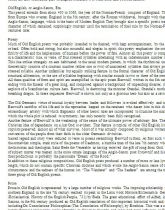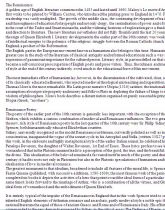Hľadaj
Zobraz:
Univerzity
Kategórie
Rozšírené vyhľadávanie
45 144
projektov
English literature (intimately)
| Prípona .doc |
Typ SOČ |
Stiahnuté 0 x |
| Veľkosť 0,1 MB |
Jazyk anglický |
ID projektu 666 |
| Posledná úprava 02.05.2017 |
Zobrazené 848 x |
Autor: - |
 Zdieľaj na Facebooku
Zdieľaj na Facebooku |
||
| Detaily projektu | ||
- cena:
18 Kreditov - kvalita:
80,2% -
Stiahni
- Pridaj na porovnanie
- Univerzita:-
- Fakulta:-
- Kategória:Jazyky » Angličtina
- Predmet:Anglický jazyk
- Študijný program:-
- Ročník:-
- Formát:MS Office Word (.doc)
- Rozsah A4:12 strán
English Literature (intimately)
English Literature, literature produced in England, from the introduction of Old English by the Anglo-Saxons in the 5th century to the present. The works of those Irish and Scottish authors who are closely identified with English life and letters are also considered part of English literature. For other Irish and Scottish authors.
Old English, or Anglo-Saxon, Era
This period extends from about 450 to 1066, the year of the Norman-French conquest of England. The Germanic tribes from Europe who overran England in the 5th century, after the Roman withdrawal, brought with them the Old English, or Anglo-Saxon, language, which is the basis of Modern English They brought also a specific poetic tradition, the formal character of which remained surprisingly constant until the termination of their rule by the Norman-French invaders six centuries later.
Poetry
Much of Old English poetry was probably intended to be chanted, with harp accompaniment, by the Anglo-Saxon scope, or bard. Often bold and strong, but also mournful and elegiac in spirit, this poetry emphasises the sorrow and ultimate futility of life and the helplessness of humans before the power of fate. Almost all this poetry is composed without rhyme, in a characteristic line, or verse, of four stressed syllables alternating with an indeterminate number of unstressed ones. This line strikes strangely on ears habituated to the usual modern pattern, in which the rhythmical unit, or foot, theoretically consists of a constant number (either one or two) of unaccented syllables that always precede or follow any stressed syllable. Another unfamiliar but equally striking feature in the formal character of Old English poetry is structural alliteration, or the use of syllables beginning with similar sounds in two or three of the stresses in each line. All these qualities of form and spirit are exemplified in the epic poem Beowulf, written in the 8th century. Beginning and ending with the funeral of a great king, and composed against a background of impending disaster, it describes the exploits of a Scandinavian culture hero, Beowulf, in destroying the monster Grendel, Grendel's mother, and a fire-breathing dragon. In these sequences Beowulf is shown not only as a glorious hero but also as a saviour of the people.
English Literature, literature produced in England, from the introduction of Old English by the Anglo-Saxons in the 5th century to the present. The works of those Irish and Scottish authors who are closely identified with English life and letters are also considered part of English literature. For other Irish and Scottish authors.
Old English, or Anglo-Saxon, Era
This period extends from about 450 to 1066, the year of the Norman-French conquest of England. The Germanic tribes from Europe who overran England in the 5th century, after the Roman withdrawal, brought with them the Old English, or Anglo-Saxon, language, which is the basis of Modern English They brought also a specific poetic tradition, the formal character of which remained surprisingly constant until the termination of their rule by the Norman-French invaders six centuries later.
Poetry
Much of Old English poetry was probably intended to be chanted, with harp accompaniment, by the Anglo-Saxon scope, or bard. Often bold and strong, but also mournful and elegiac in spirit, this poetry emphasises the sorrow and ultimate futility of life and the helplessness of humans before the power of fate. Almost all this poetry is composed without rhyme, in a characteristic line, or verse, of four stressed syllables alternating with an indeterminate number of unstressed ones. This line strikes strangely on ears habituated to the usual modern pattern, in which the rhythmical unit, or foot, theoretically consists of a constant number (either one or two) of unaccented syllables that always precede or follow any stressed syllable. Another unfamiliar but equally striking feature in the formal character of Old English poetry is structural alliteration, or the use of syllables beginning with similar sounds in two or three of the stresses in each line. All these qualities of form and spirit are exemplified in the epic poem Beowulf, written in the 8th century. Beginning and ending with the funeral of a great king, and composed against a background of impending disaster, it describes the exploits of a Scandinavian culture hero, Beowulf, in destroying the monster Grendel, Grendel's mother, and a fire-breathing dragon. In these sequences Beowulf is shown not only as a glorious hero but also as a saviour of the people.
Kľúčové slová:
poetry
drama
20th-Century literature
victorian novel
old english
prose
renaissance
modern drama
modern poetry
Obsah:
- Old English, or Anglo-Saxon, Era
Poetry
Prose
Middle English Period
Allegory
Chaucer
Arthurian Legends
The Renaissance
Renaissance Poetry
Renaissance Drama and Prose
Shakespeare
Late Renaissance and 17th Century
Age of Dryden
Age of Pope
The Romantic Poets
Romantic Prose
The Victorian Era
Non-fiction
Poetry
19th-Century Drama
20th-Century Literature
Modern Poetry
Modern Drama






